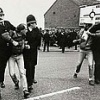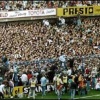It was the storm that devastated many areas of both England and France. It was the storm that put the kybosh on Michael Fish’s illustrious meteorological career. It was the storm which left me devastated. Not because of any damage that it caused (I slept through the whole thing, even though it did a great job of wrecking our back garden), but because it tore a hole in the roof of my school hall, and ensured the disco planned for the following night was cancelled, therefore ruining my chance to shimmy on over in the semi-darkness to Danny from the year above me, and try to impress him with my hair-sprayed, back-combed perm and three-shade eye shadow.
It’s part of British folklore now that the violent weather arrived out of nowhere, with no reports forecasting the widespread destruction that the storm brought with it. Michael Fish cheerfully told the country that there was nothing to worry about as there wouldn’t be a storm and so everybody went to bed happily on Thursday 15 October 1987. Waking up the next morning, many people were slightly taken aback to find their dustbins on the roof, their sheds facing a different direction , and trees lying scattered across their roads, and in some cases, their cars.
Actually there had been forecasts earlier that week that predicted the severity of the winds on either the Thursday or the Friday, but meteorological computer models later dismissed it, saying that the worst would only be apparent in the English Channel and along the south coast of England. By the afternoon of the 15th the only bad weather to be seen in the UK was some light wind, and on his BBC forecast that day Mr Fish uttered the now famous line: ‘Earlier on today apparently a woman rang the BBC and said she’d heard that a there was a hurricane on the way. Well if you’re watching, don’t worry, there isn’t. ’ What do you think his first words were when he woke up the next morning eh? To be fair to him, he did actually go on to say that it would be ‘very windy’ before trotting out the ‘along the south coast’ line again.
Look, ok - yes, if you’re going to get all pernickety on me, when he said there wouldn’t be a hurricane he was technically right, seeing as how a hurricane is actually a tropical storm and we didn’t have one of those because the UK isn’t the tropics….but he still didn’t manage to tell us we might lose a few tiles here and there did he?
So whilst I was sleeping soundly in my bed, what exactly happened during the night? Apart from the storm cackling as it set about ruining my chances with Danny of course. Grrr.
I’m not a weatherman so I’m not going to go on about technical terms (I could, but I wouldn’t have a clue what I was talking about), but in essence, a depression that started in the Bay of Biscay started heading towards the English Channel; Force 10 gales started picking up there during Thursday evening, but the late night weather forecasts for the country were still blithely sticking their fingers in their ears and predicting mere heavy rain. The storm continued to grow however, and once the Met Office realised that a) it wasn’t going to slow down, and b) it was heading inland they decided to issue severe weather warnings to agencies, emergency authorities and the Ministry of Defence.
The storm raged throughout the night and continual 81 mile per hour gusts of winds were recorded across the south east, but these were mere babies in comparison to those of 120 and 122 mph that hit Norfolk’s Gorleston and West Sussex’s Shoreham-by-Sea respectively. Many of the anemometers that measured wind speed were reliant on the mains electricity, and so data was lost when the south-east suffered the major power cuts that I’ll mention in a minute, and the Royal Sovereign Lighthouse (off the coast of Eastbourne) recorded 110mph, but only because their instruments couldn’t read speeds any higher.
An estimated 15 million trees were blown over that night; Sevenoaks lost six of the trees that gave the town its name whilst Kew Gardens, Hyde Park and Bedgebury National Pinetum amongst others all lost historic trees. The blowing over of many others damaged buildings and cars, knocked out power supplies and blocked roads and railway lines, leaving public transport in London virtually at a standstill. The National Grid, for the first time, had to shut down the South East power supply (hence all the power cuts) when broken cables started short circuiting and causing the main system to overheat, this being the only way to stop the entire country’s supply collapsing. So now, not only did many people suffer the trauma of discovering their massively damaged property, they were now also prevented from brewing a nice cuppa to calm their nerves.
It wasn’t just on land that damage happened; lots of small boats were destroyed, a ferry ran aground at Folkestone and a ship capsized off the coast of Dover. Shanklin Pier, on the Isle of Wight was broken into three pieces by the huge waves.
Are you remembering that I slept through all of this? OK, so no big trees fell near where I lived, but our compost bin and a couple of fence panels were real write-offs…
England wasn’t the only place battered by ‘the great storm’ (or ‘the cancelled disco’ as I prefer to remember it), France also felt its wrath. Brittany lost more than 24% of its forest that night, whilst 1.79 million homes lost their electricity and water supplies. Around 23 billion francs (this took place when France still had proper money) worth of damage was done to our continental cousins, whilst in the UK insurance companies shelled out £2 billion on approximately 1.3 million reports of damage (600 in the London borough of Ealing alone). It also had an effect on the City stock markets as so few dealers were able to get to their place of work and were thus unable to react to the dramatic Dow Jones slide on Friday 16th.
Although it has been widely repeated that the storm of 1987 was the worst since one in 1703, actually storms of this magnitude occur regularly over the North Atlantic. 1987 was different in that the wild weather hit a densely populated area of the country, resulting in the deaths of 22 people in France and England, mainly due to trees and buildings collapsing. Horrendous though this was, had the worst of it hit during the day when many more people were out and about and not in the relative quiet of the early hours, the results could have been a lot more devastating.
So, to sum up then: lots of wind, fallen trees, bashed up cars, some topsy-turvy boats and a REALLY annoyed school girl. I found out at school on Monday that Danny had gone to a party on Friday night instead where Jane from Mr Carter’s class had asked him out and he’d said YES. They’ve been married for about 15 years now so I should probably let it go, but I still blame the storm. That should have been me.










Do You Remember Great Storm of 1987 (UK)?
Do You Remember Great Storm of 1987 (UK)?